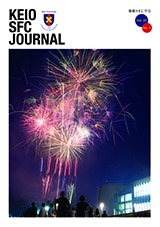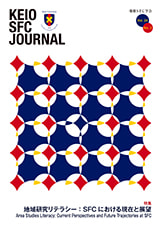- HOME
- KEIO SFC JOURNAL
- Vol.25 No.1

-
[Special article by retiring faculty]
Tripped Up by My Own Standards ―A Message for Future Life Science Researchers
Akio Kanai (Professor, Graduate School of Media and Governance, Keio University / Professor, Faculty of Environment and Information Studies, Keio University) For the majority of you who have entered university with a solid academic background, it is important to understand how to choose a research topic and publish scholarly work. As I approach retirement from my faculty position at Keio University in March 2026, I wish to share key insights and guidance offered to life sciences students at SFC through teaching and research. This essay serves as a parting message—a summary of what I have tried to convey over the years.
Download this article (PDF):SFCJ-25-1-01.pdf
-
[Special article by retiring faculty]
Co-creative Research from the Intersection of GIS, Environment, and Urban Studies at SFC ―A Three-Decade Biography
Wanglin Yan (Professor, Faculty of Environment and Information Studies, Keio University) This article summarizes the author’s thirty years of interdisciplinary and practice-oriented educational and research activities, centered on Geographic Information Science (GIS), for the sustainable development of urban and regional areas. Born and raised in a rural village in China, the author came to Japan in the early time of Reform and Opening-Up, and encountered Keio University’s Shonan Fujisawa Campus (SFC) in the early 1990s. At SFC, the author transformed GIS from a tool for mapping and spatial analysis into a comprehensive knowledge system of “space and creation,” which was implemented across various educational programs and contributed to the cultivation of numerous environmental leaders. Furthermore, through domestic and international research projects on topics such as urban and regional ecological assessment, resilience, and the food-energy-water (FEW) nexus, the author engaged in co-creative efforts with colleagues from multiple disciplines and sectors, thereby building a practical research framework for sustainable urban and regional development.
Download this article (PDF):SFCJ-25-1-02.pdf
-
[Research articles]
Motherhood, Migration and COVID-19 ―French Mothers’ Perinatal Experience in Japan
Mpacko Anne-Sophie (Doctoral Program, Graduate School of Media and Governance, Keio University) Yoko Hamada (Professor Emeritus, Keio University) Akiyoshi Okada (Professor, Research Center of Health, Physical Fitness, and Sports, Nagoya University) This paper is part of a longitudinal study about French mothers in Japan. We explore the perspective of a privileged migration to bring out new knowledge about migrant mothers’ perinatal mental health. We have designed an exploratory mixed research method with qualitative and quantitative data based on responses to an online survey. As a result, we have found that (i) perceived cultural differences and language barriers had more serious long-term consequences on mothers’ mental health than COVID-19 restrictive measures, and (ii) the interpersonal quality of patients-medical staff’s relationships had a key role to balance out negative experiences.
Download this article (PDF):SFCJ-25-1-03.pdf
-
[Progress reports]
The Legal Protection of Fictional Characters under Japanese Copyright Law ―Case Law and Theoretical Perspectives
Kenta Yamamoto (First Year, Master’s Course, Program in Interdisciplinary Intellectual Property Laws, Graduate School of Interdisciplinary Intellectual Property Laws, Kokushikan University) This article examines the legal protection of characters under Japanese Copyright Law. The Supreme Court of Japan determined that the concept of a “character” itself does not qualify as a copyrighted work. However, specific expressions of a character are protected. Despite this, “literary characters” receive legal protection only in limited cases, as the boundaries of their expression are unclear. Additionally, the court’s approach to determining the similarity of works is based on a dualist perspective. However, a monist perspective, which critiques this approach, is considered more convincing.
Download this article (PDF):SFCJ-25-1-04.pdf
-
[Academic trend reports]
Media as Ontology and Epistemology ―Rethinking Postman’s Argument with Insights from China
Haoguang Li (Doctoral Program, Graduate School of Media and Governance, Keio University) Songqi Han (Doctoral Program, Graduate School of Arts and Sciences, The University of Tokyo) This paper examines the transformation of media in the new era. Taking into account Neil Postman’s statement “media as epistemology,” this paper analyzes the ontological nature of new media and argues that the prevalence of personal media in the new era has resulted in an amplification of large-scale ontological reconstruction of people. Using the examples from China, it suggests that the rapid growth of new media may cause many social problems at both individual and national levels, and scholars should pay attention to the more penetrable intrusiveness of new media.
Download this article (PDF):SFCJ-25-1-05.pdf
-
Download this article (PDF):SFCJ-25-1-column.pdf[Column]
Cover Photo ―Connecting SFC Moments to the Future: My Favorite Snapshot of SFC
